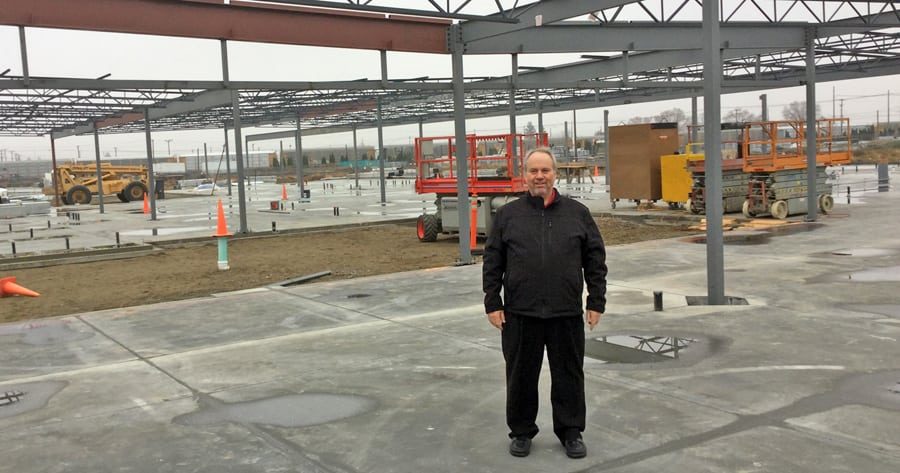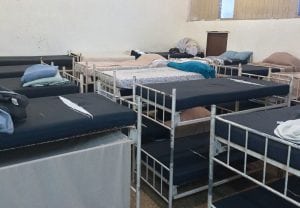
Home » Tri-City Union Gospel Mission expects to open facility next year
Tri-City Union Gospel Mission expects to open facility next year

December 13, 2017
Path to raise $10 million to build new mission is six years in the making
Andrew Porter recently walked on the cement around the steel beams at what will become the new Tri-City Union Gospel Mission next year, and tried unsuccessfully to contain his excitement.
“It’s becoming more real,” said the executive director of the Pasco-based mission.
The quest to build the new mission —behind the Thunderbird Motel near Fourth Avenue in downtown Pasco — is going on six years.
Ground was broken in August of this year, and the project — being built by Siefken & Sons Construction of Richland — is expected to be complete by Oct. 1, 2018.
“It’s been a battle raising $10 million,” Porter said. “But I knew that God called me here for something. Back in the beginning, we estimated it would cost $6 million. Now it’s at $10.4 million. I didn’t let that dissuade me. It’s a huge undertaking. But if God was in it, I wouldn’t have to worry.”
Porter said the project is necessary to serve the community’s needs.
“If I didn’t believe this was needed, I wouldn’t do it,” he said.
The current mission is at 112 N. Second Ave., a few blocks away.
It’s a 100-year old building built in 1917 as the Masonic Temple. In 1958, the UGM moved in, as a group of five local businessmen – noticing the large number of transients coming through town – paid $25,000 for the building.
“It was paid off around 1966 or 1967,” Porter said.
But a century-old building has its own problems maintenance-wise. It has 8,800 square feet, but the main floor – which is 3,000 square feet – is where most everything happens.

The men’s dorm can sleep 105, with 55 getting beds and another 50 sleeping on mats on the floor.
The current men’s dorm has about 22 bunk beds squeezed together with a foot of space in between beds.
“We’ve had 95 men the last couple of nights,” Porter said.
On cold nights, the mission has had to turn away some men, sending them to a cooperating motel.
There are just a few showers for the men. The kitchen is tiny, and the dining area can seat only 30 people at a time.
The new building will be 40,000 square feet, with the main entrance off Fourth Avenue.
There will be four 26-bed rescue dorms.
Those are for men in rescue mode.
“Where will I sleep tonight? What will I eat tonight? That kind of situation,” Porter said.
Another five five-bed dorms, five more two-man rooms, and 15 one-man rooms are available to men who are able to recover their position in life, trying to work at new jobs and integrate back into the community.
In all, the new building will have 154 beds for men.
The kitchen size will quadruple, and the dining room will be able to accommodate 150 people.
A chapel in the new building will be able to seat 200.
There will also be a day room, medical office, reception desk, 25 showers, two classrooms, and office space for mission officials.
The number of people in need of help seems to rise every year.
“People make bad choices,” Porter said. “But a lot of people are here because of medical situations.”
The men’s inability to get medication has put some in dire straits, Porter said.
The average age of men living in the shelter is 30.
“But I have some guys in their 80s here,” Porter said.
The Union Gospel Mission posted the following statistics on homelessness on its website:
- More than 30,000 people in the Tri-City area are living below the poverty line, with many a paycheck away from being homeless.
- There are 2,082 unsheltered homeless individuals in southeastern Washington recorded on a single day point-in-time count.
- There’s more than 1,000 people living on the Tri-City streets.
- There’s more than 800 homeless children in Benton and Franklin counties.
- 644 people are considered chronically homeless.
- About 232 have chronic substance abuse issues.
- 158 people are homeless veterans.
The mission has tried to help, providing 73,435 hot meals served over the past year; 33,567 nights of provided shelter; serving more than 3,000 men, women and children and more than 1,000 families.
“Homelessness is a problem all over the state and country,” Porter said. “We have a homeless camp in Kennewick now. Homeless camps are a reality. They’re in Yakima, Walla Walla, and now Kennewick.”
When he joined the mission in 2009, he said he was the 10th employee there.
“We now have 23 employees,” Porter said. “In comparison, Yakima has 50, and Spokane has 220.”
Porter said the number of meals served a day has recently increased.
“We’re up to about 300 meals a day,” he said. “And it’s trending to push up this year.”
Andrew Porter, and his father Don – who was the acting executive director at the time in 2011 – decided to plan a new facility.
The mission bought six acres of land from BNSF Railway.
Don Porter retired in 2013, and his son took over as executive director.
“Fundraising wasn’t what I do when I came here (in 2009),” Andrew Porter said. “So I went to other missions to see what they’ve done. We started a plan, and our thought was as we continued to try to raise funds, we’d try to become more than a shelter. More of a life transformation center.”
So Porter and his staff started the Rescue-Recovery-Restoration program.
The idea is after the person is in rescue mode, he needs some time to get himself together.
Then a case worker would work with him to help him find a job, update the mission with reports, and get him back into the community as a productive citizen.
“It’s not just about housing more people,” Porter said.
“Right now, we have one case worker for 100 men. It’s mandatory when women come in, within five days they have to meet with a case manager.”
So Porter wants to add a second case worker for the men by January, and when the new facility opens, add a third.
The goal is to have a case worker-to-men ratio of 1-to-20 or 1-to-30.
“The plan is for people to have goals,” Porter said. “Chop those goals up so they’re not so overwhelming. They meet with the caseworker and they work on those goals. It really has worked well.”
The women’s and children’s building was built in 1914, next door to the current mission, at 110 N. Second Ave., but it’s not as full as the men’s building.
“Women will stay there for a while,” Porter said. “We want to build a new women and children’s building in Kennewick.”
The mission already has a halfway house in Kennewick for women.
As for the current men’s shelter, Porter wants to close out the bottom and top floors and use the main floor as a temporary women’s shelter for single women with drug problems or working as prostitutes.
“We believe there is a need there,” he said.
Seventy percent of the money needed for the new building has been raised with 30 percent coming through three grants.
“It was a little of everything,” Porter said. “Some of it came through mailings. And I was talking to enough people.”
An anonymous donor gave $2.2 million. The Community First Bank board of directors gave $900,000 of its own personal money.
“McDonald’s had its 10 Tri-City stores donate 40 cents from every drink it sold between Dec. 1 and Dec. 24. That ended up being $127,000,” Porter said. “But a number of $25, $50, $100 and $1,000 donations came from the community after just talking to people.”
The community has responded to the need and with construction underway, Andrew Porter can’t help but be excited.
“We’re working on getting people back out in the community. Help get them a job,” Porter said. “And as many people as we can get through, that opens up beds.”
To learn more about how to donate to the mission — either time, needed items or financially — visit tcugm.org/give.
Local News Year in Review
KEYWORDS december 2017




